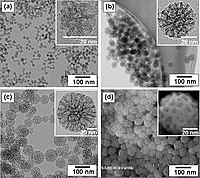
Photo from wikipedia
Abstract Contrast agents are heavily used in order to increase the accuracy of imaging based diagnostic techniques and since they are intravenously administrated, these agents need to be hemocompatible and… Click to show full abstract
Abstract Contrast agents are heavily used in order to increase the accuracy of imaging based diagnostic techniques and since they are intravenously administrated, these agents need to be hemocompatible and cytocompatible. This work is a follow-up of a previous study where iron doped hydroxyapatite nanoparticles proved to increase contrast in MRI, however they were also highly thrombogenic when in contact with blood. To overcome this drawback, a poly(ethylene glycol) coating was added to these nanoparticles in order to increase hemocompatibility, cytocompatibility and act as a drug carrier, where two different types of PEG were tested. After PEGylation, the PEG coating around the nanoparticles was confirmed and quantified, comprising between 3 and 5% of the total mass of the particles. Furthermore, both coated and non-coated particles were non-haemolytic as already expected, however only the PEGylated ones proved to be non-thrombogenic. Regarding cytocompatibility, at the end of 48 h of exposure only the PEGylated particles were non-cytotoxic, proving the relevance of the coating. Additionally, the polymeric matrix was capable of increasing the nanoparticles drug loading capacity. From all these results, it was possible to conclude that PEGylation of iron doped hydroxyapatite nanoparticles provides a dual functionality, both increasing biocompatibility and drug loading.
Journal Title: European Polymer Journal
Year Published: 2020
Link to full text (if available)
Share on Social Media: Sign Up to like & get
recommendations!